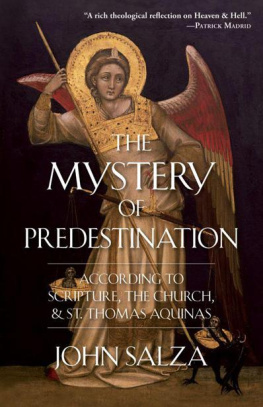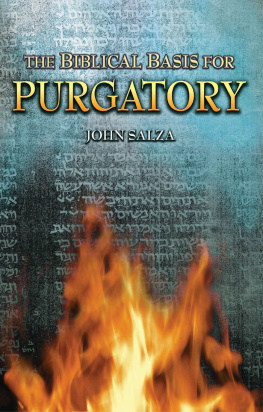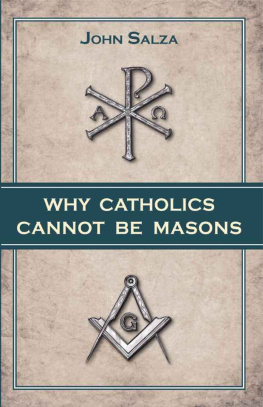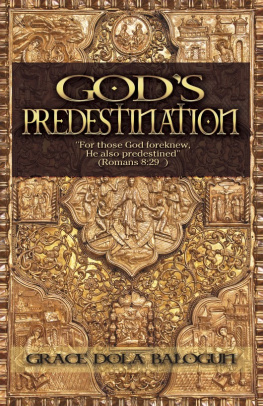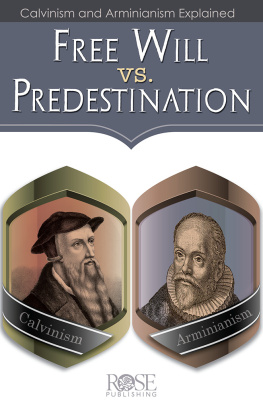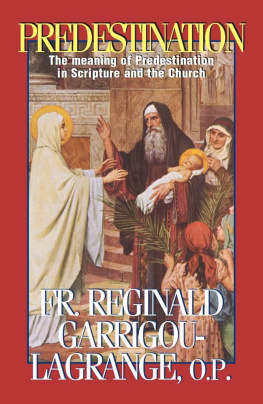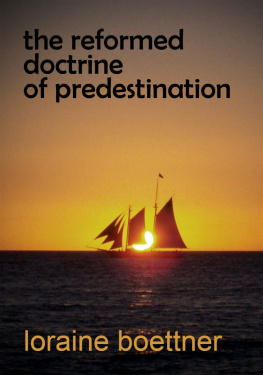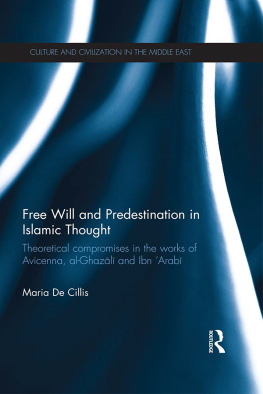THE MYSTERY
of
PREDESTINATION

THE MYSTERY
of
PREDESTINATION
According to Scripture, the Church, and
St. Thomas Aquinas

By
John Salza
TAN Books
Charlotte, North Carolina
2010 John Salza
All rights reserved. With the exception of short excerpts used in articles and critical reviews, no part of this work may be reproduced, transmitted, or stored in any form whatsoever, printed or electronic, without the prior written permission of the publisher.
ISBN: 978-0-89555-905-0
Cover design by Milo Persic, milo.persic@gmail.com.
Front cover image: Guariento di Arpo (fl. 1338-d.1367/70). Angel weighing souls and combating a devil. Photo credit: Cameraphoto Arte, Venice/Art Resource, NY.Musei Civici, Padua, Italy. Back cover image: Osvaldo Bignami (1856-1936), Thomas Aquinas Fresco (1909), in the Chapel of Our Lady of Pompei, in the church of Santa Maria del Carmine, Italy. Picture by Giovanni DallOrto.
Printed and Bound in the United States of America
TAN Books
Charlotte, North Carolina
2010

To my dear friend:
Fr. Thomas Scott
Thank you for encouraging me to address this most difficult topic, and to find the truth in the teachings of St. Thomas, Universal Doctor of the Catholic Church.
Predestination is a doctrine clearly revealed in Scripture and taught by the Catholic Church for 2,000 years. However, the doctrine is rarely explained in modern catechisms and almost never addressed in the Sunday sermon.1 This is in part because predestination is one of the most sublime of all the doctrines of the Catholic faith. But its omission in sermons and catechism classes is seemingly not due to its sublimity alone. After all, the doctrine of the Blessed Trinity is equally mysterious. We dont understand how God can be three Persons and still be one God. Yet it is the subject of many sermons and catechisms.
Unlike the doctrine of the Trinity, which reveals who God is, the doctrine of predestination reveals how God chooses . Specifically, it states how God chooses to infallibly direct certain people (whom Scripture calls the elect)2 to salvation, and how God chooses to allow certain other people (the reprobate) to fall way from salvation. Many people would rather talk about our freedom to choose God rather than Gods freedom to choose us. Sermons and catechesis seem more pleasant when they focus on Gods love and goodness for humanity rather than His complete sovereignty over His creatures. Nevertheless, Gods plan of predestination exists precisely because of His love and goodness.
As this book demonstrates, God loves all men and grants all sufficient grace to be saved in Jesus Christ. Even though God predestines His elect to heaven, God makes it really possible for all men to follow His precepts and never commands the impossible. Those who are saved are saved by Gods special grace, and those who are condemned are condemned by their own choosing . Thus, God communicates His goodness by saving the elect in His mercy, and by condemning the reprobate in His justice. This means the elect must give all the glory to God for their salvation, and the reprobate must blame only themselves for their condemnation. God has implemented His plan of predestination so that the elect have nothing to boast about, and the reprobate have nothing to complain about.
The doctrine of predestinationwhich seeks to reconcile Gods sovereign liberty with human free willis an incomprehensible mystery. We cannot understand how God wills all men to be saved and yet chooses His elect for salvation. Although we can comprehend these truths in isolation, they appear contradictory when we attempt to reconcile them. It seems impossible that they could coexist. This is because both of these truths proceed from the inscrutable and unfathomable God, in whom infinite mercy, infinite justice, and infinite sovereignty reside. As St. Paul says, How incomprehensible are his judgments, and how unsearchable his ways! (Rom. 11:33).
Because the reconciliation of these truths surpasses our understanding, we must be careful not to emphasize one of the truthsGods sovereignty or mans free willat the expense or exclusion of the other. For example, when Scripture emphasizes Gods sovereign action over man, one cannot exclude human free will, which is moved by that action. Likewise, when Scripture emphasizes the human capacity to repent and come to God, one cannot dismiss that the act of repentance is brought about by Gods grace. Excluding or minimizing one of these truths is the cardinal error of bad exegesis, particularly when addressing predestination. This book attempts to hold both truths in balance while concluding in no uncertain terms that Salvation is of the Lord (Ps. 3:9) and Destruction is thy own, O Israel (Hos. 13:9).
God has not revealed the doctrine of predestination to scare us (although a holy fear of God is good)3 but to move us to completely abandon ourselves to His providence and holy will. As we say in the Our Father, Thy will be done. This self-abandonment to God should not only humble us but should also give us comfort as we work out our salvation with fear and trembling (Phil. 2:12). We should be comforted in knowing that whenever we do any good that is beneficial to our salvation (prayer, good works), it is God who is working in us both to will and to accomplish that good (Phil. 2:13). Thus, our salutary acts are a great sign from God that He is predestining us to the glory of His heaven, where we will gaze in wonder on the Blessed Trinity for all eternity.
All the works of the Lord are exceedingly good. There is no saying:What is this, or what is that? For all things shall be sought in their time (Ecclus. 39:21, 26).
John Salza, J.D.
7 March 2009, Anno Domini
Feast of St. Thomas Aquinas
1. The current Catechism of the Catholic Church (CCC) mentions predestination only once in paragraph 600: To God, all moments of time are present in their immediacy. When therefore he establishes his eternal plan of predestination, he includes in it each persons free response to his grace.
2. The scriptures use the term elect (Greek, eklektos ) in 2 Kg. 22:27; Tob. 13:10; Ps. 17:27;88:4; Wis. 3:9; Eccles. 11:33; 24:4, 13; 46:2; 47:24; Isa. 42:1; 45:4; 65:9, 15, 23; Zach. 9:17; Matt. 24:22, 24, 31; Mark 13:20; Luke 18:7; 23:35; Rom. 8:33; 16:13; Col. 3:12; 1 Tim. 5:21; 2 Tim. 2:10; Titus 1:1; 1 Pet. 1:1; 2:6; 2 John 1:1, 13; Apoc. 17:14.
3. In fact, Scripture says fear of the Lord is the beginning of wisdom (Ps. 110:10; Prov. 1:7;9:10) and one of the seven gifts of the Holy Ghost (Isa. 11:3). This means that a holy fear of God is one of the effects of predestination.
Predestination and
Divine Predilection
P redestination is the process by which God by His grace directs man to eternal life. This plan to direct man to eternal life is part of Gods providence over all His creation. As the Catechism says, [P]rovidence consists of the dispositions by which God guides all his creatures with wisdom and love to their ultimate end.1 Indeed, Gods providence over all things is one of the most powerful proofs of His existence. The Book of Wisdom teaches that Gods providence reacheth therefore from end to end mightily, and ordereth all things sweetly (8:1); but thou has ordered all things in measure, and number, and weight (11:21); But thy providence, O Father, governeth it: for thou hast made a way even in the sea, and a most sure path among the waves (14:3).2
Because Gods providence governs all things, God is in control of all things and can do all things, for He says, Is there any thing hard to God? (Gen 18:14) and Behold I am the Lord the God of all flesh: shall any thing be hard for me? (Jer.32:26). Job confessed to God, I know that thou canst do all things, and no thought is hid from thee (Job 42:2). God has absolute sovereignty over the course of events and is the sovereign master of his plan.3 Gods control over His entire creation means that His purpose in ordering things to their final end is always accomplished. God says through Isaiah, Surely as I have thought, so shall it be: and as I have purposed, [s]o shall it fall out (14:24-25); and, My counsel shall stand, and all my will shall be done (46:10).St.Paul confirms that God predestines man according to the purpose of him who worketh all things according to the counsel of his will (Eph. 1:11).
Next page
